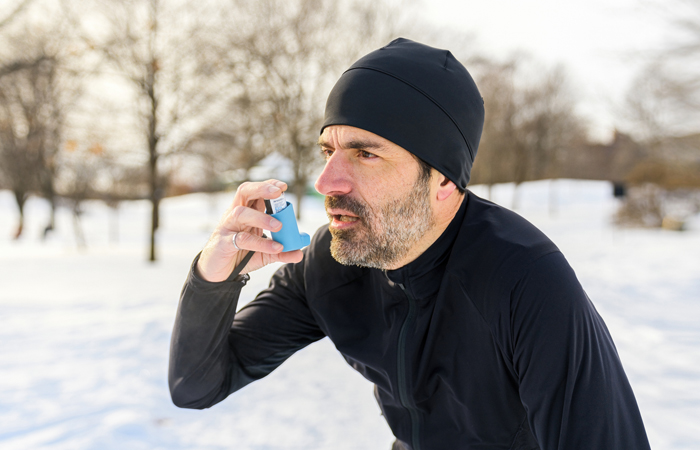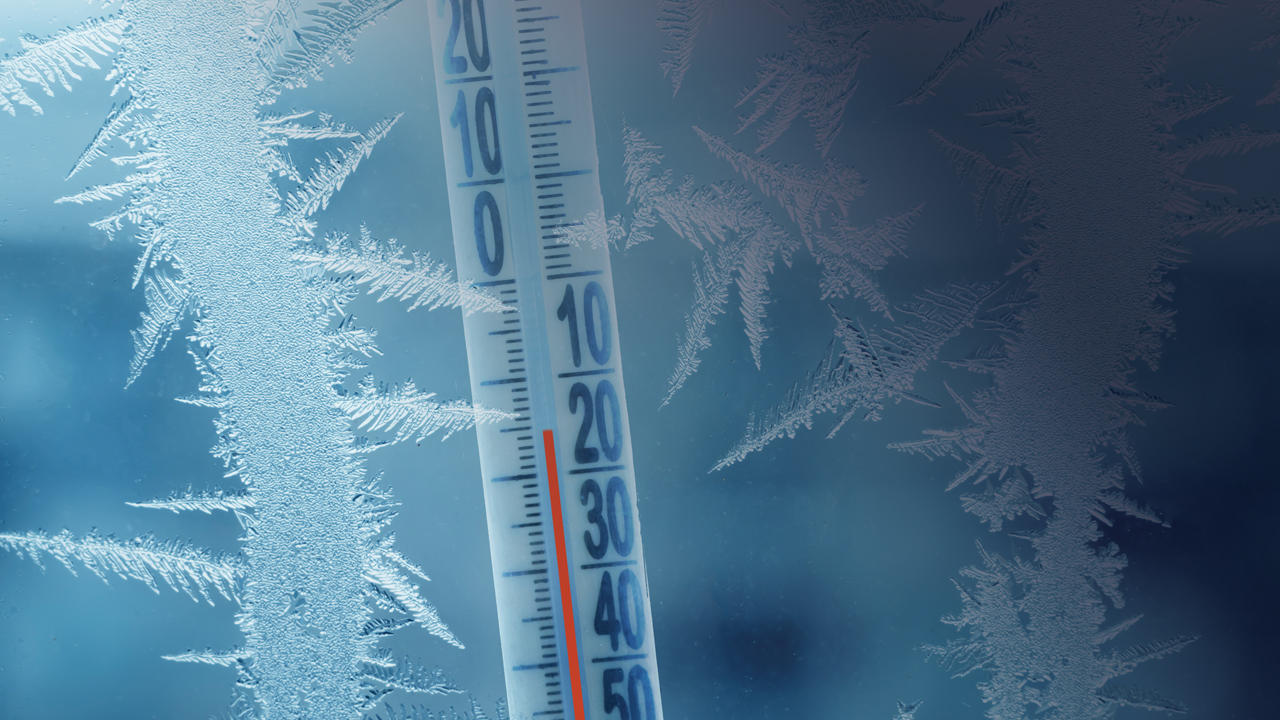In In-depth
Follow this topic
Bookmark
Record learning outcomes
An estimated 4,950 excess winter deaths in the UK were caused by living in cold homes during winter 2022/23, found the End Fuel Poverty Coalition. Yet, according to Uswitch research in September 2025, more than two million households say they won’t turn on their heating this winter, an increase on last year, due to the costs involved.
The 2023 Health Effects of Climate Change (HECC) report, by the Centre for Climate and Health Security (CCHS) and UK Health Security Agency (UKHSA), provides an analysis of how climate change makes extreme weather events such as cold more intense and variable.
The report found that the greatest driver of cold-related (and heat-related) deaths in the UK is the vulnerability of older adults to extreme temperatures.
As people get older, it becomes harder for their body to detect how cold they are, and it takes them longer to warm up, which can affect their overall health.
In addition, when the weather gets colder, more older people tend to stay indoors, which can make it easier for illnesses to spread, especially respiratory infections such as colds and flu.
“Older people on low incomes are increasingly bed-bound by the cold – forced to turn in early in hats, gloves, scarves, and with extra blankets during the winter to stay warm,” says David Southgate, policy manager at Independent Age.
"Many have fallen into debt in a bid to keep the heating on, and with yet another difficult winter just around the corner, they need immediate support. Historic records also indicate that when the mean winter temperature in the UK drops below four degrees [Celsius], the level of excess winter deaths skyrockets. The average temperature [of winter 2022/23] was 4.3 degrees.”
“Ensuring people are preparing for winter now will help the pharmacy sector to be in the best place possible to support people”
Reducing the risks
Many deaths related to cold weather could be prevented with proper advice, support and financial help.
The National Health and Care Excellence (NICE) NG6 guideline on ‘Excess winter deaths and illness and the health risks associated with cold homes’, published in March 2015, contains recommendations on how to reduce the risk of death and ill health associated with living in a cold home.
Many health problems associated with cold homes are experienced at ‘normal’ winter temperatures (when the mean outdoor temperature drops below 5°C to 8°C), and not just during extremely cold weather.
The risk of death and severe illness increases as the temperature falls further but can also remain higher for up to two weeks after a cold spell has ended.
According to the NG6 guideline, people most vulnerable to the cold include those with:
- Cardiovascular or respiratory problems
- A learning and/or physical disability that stops them moving around or makes them more prone to chest infections
- A chronic health problem or disability that means they spend longer than the average amount of time in their home
- Financial problems that mean that they can’t afford to keep themselves or their home warm during the winter months
- Poor quality housing, which means homes are much colder than they should be.
“We are lucky to have varied and wonderful weather in the UK, but extreme weather conditions are a major risk to health,” says professor Hannah Cloke, meteorologist at the University of Reading.
“When temperatures drop, there can be an increased strain on the human body as it works harder to maintain its core temperature. This can worsen symptoms for people with chronic conditions and increase the risk of heart attacks and strokes."
"The cold also affects people’s mobility and confidence in getting out, which can lead to isolation, and things like missed medical appointments. Cold homes can contribute to dampness and mould, potentially adding to respiratory conditions such as asthma.”

Cold weather alerts
The UKHSA’s Cold-Health Alerts focus on the weeks between 1 November and 31 March each year. These alerts are issued when cold weather is forecast that could lead to significant impacts on health.
The UKHSA website advice on ‘Keeping warm and well: staying safe in cold weather’ recommends that during the colder months people:
- Try to heat rooms they spend a lot of time in, such as the living room or bedroom, to at least 18°C
- Try to reduce draughts – fitting draft excluders around doors can be done quite cheaply
- Keep bedroom windows closed at night
- Wear several thin layers, rather than one thick layer, to trap heat close to the body
- Seek financial support, such as grants and benefits that make a home more energy efficient, improve heating or help manage energy bills
- Try not to sit still for more than an hour or so
- Wear shoes with good grip to avoid slips and falls on slippery or icy surfaces when out and about.
“Last winter we heard from many thousands of older people who were worried about how they would cope when winter really took hold,” says Caroline Abrahams, charity director at Age UK.
“This year, lots of older people will be worried about putting their heating on again. We would encourage any older person who is concerned to contact Age UK or visit our website (ageuk.org.uk) to see if they are eligible for additional financial support.”
Health risks of cold weather
According to the Local Government Association, direct cold exposure can cause death or severe illness due to hypothermia (a core body temperature of less than 35°C). Signs and symptoms of hypothermia include:
- Shivering
- Cognitive impairment
- Changes in pulse and respiratory rates
- Changes in blood pressure.
Deaths in which hypothermia is the primary cause are relatively rare in the UK. However, cold weather also increases the risk of heart attacks and strokes, breathing problems and respiratory diseases, and infections such as flu and norovirus.
Each year in the UK there are thousands of additional deaths from heart and circulatory diseases in the winter months, according to the British Heart Foundation.
Cold temperatures cause blood vessels to narrow in certain parts of the body, such as the skin, fingers and toes, so less body heat is lost. This means the heart must work harder to pump blood around the body, increasing the heart rate and blood pressure.
People are also more likely to slip and fall in snow or ice, sometimes experiencing serious injuries. Cases of indoor carbon monoxide poisoning typically increase during the winter months because people are less likely to ventilate their homes and use cooking or heating systems that worsen indoor air quality.
The colder months can also worsen or increase the risk of developing mental health conditions such as depression and anxiety due to social isolation, if people don’t go out to take part in their usual activities.
Although not directly related to cold weather, seasonal affective disorder (SAD) is often called winter depression because the symptoms occur or become more noticeable during the winter months.
The exact cause of SAD is unknown, but the condition has been linked to reduced sunlight levels during shorter autumn and winter days.
Pharmacy support
According to September 2025 guidance from the UKHSA and CCHS on ‘Supporting vulnerable people before and during cold weather: for healthcare professionals’, if a drop in temperature (prolonged periods below 2°C, or a sudden drop) impacts on health, this is known as ‘adverse cold weather’.
Healthcare professionals, including community pharmacy teams, can protect vulnerable people by signing up to local and national weather alerts, being aware of the potential health risks of adverse cold weather and promoting vaccinations for those eligible to reduce the risks from Covid-19 and flu.
“Cold temperatures can increase the risk of heart attacks and strokes, and people with cardiovascular disease are also more at risk of serious illness if they get seasonal respiratory infections like flu,” says Ruth Goss, senior cardiac nurse at the British Heart Foundation.
“It’s especially important that people living with heart conditions are well prepared for the cold snap this winter by wrapping up warm and having their free flu jab.”
Pharmacy teams can encourage customers to make sure they have sufficient supplies of regular medicines in case they can’t get to the pharmacy during adverse weather.
“Often, the local pharmacy is closer to older people’s homes and easier to get to than their GP surgery, making it a really valuable first port of call,” says Caroline.
“Ensuring people are preparing for winter now will help the pharmacy sector to be in the best place possible to support people when it comes around. Winter weather can make it harder for older people to get out and about, so providing prescription and medication delivery services where this is possible will support many older people who may not be able to physically get to a pharmacy.”
Community pharmacy teams can offer advice and products to manage common winter ailments such as colds or sore throats. Vitamin D supplements should be recommended at this time of year as falling sunlight levels mean that the body produces less of this essential vitamin.
Pharmacy teams can also advise on managing long-term health conditions that could worsen in cold weather. Cold air, for example, can tighten the airways, making it harder to breathe, and cause blood vessels to constrict, increasing chest pain in angina.
Wearing a face mask or a scarf wrapped loosely around the mouth and nose means that customers are breathing in warmer air outdoors, reducing their risk of symptoms.
Pharmacy teams are also well placed to notice if a customer isn’t coping well during the winter months and offer relevant support and recommendations, such as a hot water bottle or an electric blanket to keep warm, as this is usually cheaper than turning on central heating.
They could also keep a list of useful contact details on display, such as the Winter Fuel Payment helpline (0800 731 0160) and the local Citizens Advice (citizensadvice.org.uk).
Someone who can’t afford to heat their home may be under extra stress, choosing between heating, food and other essentials to avoid the risk of debt, which may affect their overall health. However, they may not want to admit that they are struggling.

